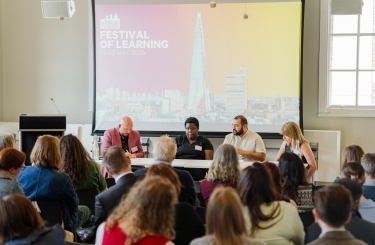Related


What’s it like working as a network of funders trying to create change? Where do funders sit in a wider ecosystem of movements and civil society groups working towards fundamental reform?
Continuing on with our learning focus on systemic change, we spoke with Jonathas Azevedo, Programs Advisor at the Brazilian-based Comuá Network, a group of funders working in the fields of socio-environmental justice, human rights and community development. Jonathas shared his learning about what it means to put communities in the driving seat, funders being partners rather than gatekeepers for change and more.
Many of the themes we discussed with Jonathas resonated with our own work and that of our members here in the UK – engaging and learning with colleagues across the world help shape our own thinking as we look to how collectively tackle some of the challenges we need to face together, from the climate crisis to poverty and injustices facing London’s communities.
The Comuá Network brings together what we call independent grant making organisations in Brazil. By that we mean organisations who mobilise resources from different donors, rather than being tied to a corporation or wealthy family. They are mostly organisations that were created from social movements in Brazil. They have independent governance that’s usually comprised of social movement representatives, community members and so on.
We were established in 2012 and the idea was to bring those independent grant making organisations together because when we look at the philanthropic ecosystem in Brazil, it’s mostly comprised of private corporations, family foundations etc. Independent grant making organisations didn't feel connected with that wider philanthropy ecosystem – the way they were doing grant making and engaging with civil society was very different. Local philanthropy in Brazil is very conservative and won’t necessarily support initiatives around socio-environmental justice and human rights.
So the Comuá Network came out of a desire to have this creative space to exchange experiences and insights but most importantly to promote and advance community and social justice philanthropy in Brazil.
One of our main areas of work is our advocacy programme which has three main pillars: the first is centred around coalition building, facilitating joint campaigns, connections and alliance among members; the second is around knowledge production – we do a lot of research when it comes to community and social justice philanthropy in Brazil, because there isn’t much on community and social justice philanthropy in Brazil, so for us it’s really key to evidence and showcase examples of other ways of doing philanthropy and supporting civil society (we recently did a mapping of independent grantmaking organisations in Brazil, which we’ve translated to English here). Connecting to that is the third pillar which is around communications and partnership. Part of our advocacy is also to influence those more traditional donors to change their practice.
What connects all of our members is their role in strengthening civil society and democracy by supporting minoritised group accessing their rights.
It's interesting because independent grant makers and those working in ‘community philanthropy’ don’t see themselves as the main protagonists of transformation – the actors that are really pushing for systemic change are civil society actors – in their full diversity of movements, collectives, civil society organisations and so on. So, when it comes to community philanthropy actors, they are funding the transformative work and they’re making it more flexible and accessible, so they see themselves more as enablers and facilitators in this transformative process.
So for us at the Comuá Network when it comes to systemic change, it’s about funding and supporting the ones who are spearheading this change, rather than funders changing the systems directly themselves.
It wouldn’t be right for me to try and speak on behalf of all the civil society groups in Brazil but what we’re hearing is the need for flexible, multi-year funding that supports the operation of these groups. It's about respecting the autonomy and knowledge that these groups have – they know what the solutions are and they know what they need.
People think it's just about spending the money and that's it. It's about relationships, building trust, this active engagement, listening to civil society groups and being part of the goal of fundamental change
Many of these groups are not necessarily established organisations or even want to be, they are part of social movements or indigenous groups working to protect their rights – most of the groups Comuá members support fall in this category. I think it’s about developing a way of funding that is not just about financial support but about intelligence sharing, expertise of how to engage with these groups, how to respect their interests and actively engage and listen with them. They know how to support these social movements either through a fiscal sponsor or other creative strategies, rather than forcing them to register as charities and adopt these more traditional governance models.
Our members also look at how they can support groups with self-care initiatives and protections for human rights defenders – that is something traditional funders won’t necessarily be interested in funding but we know for groups led by political minorities they live in a context where they’re constantly attacked so they need that kind of support.
I think one of the biggest challenges is around time and lack of human resources to do this work – to build collective voices and narratives demands time, not just from us but also our members.
Another challenge is of course funding – our members have to mobilise funding from different sources, different foundations and so on. Fundraising takes time and it’s fundamental to our members’ work. The other issue that comes up for us as a network is the overall ‘movement washing’ and the co-opting of certain agendas. A recent example we’ve seen in Brazil is around decolonising philanthropy. Also, after the murder of George Floyd, lots of foundations established DEI initiatives and working groups but now we’re seeing that this is less of a priority and not being sustained. So, there is a challenge around this short-term engagement in anti-racism work but it’s not sustainable.
Now is the moment for us to continue to support those civil society groups and those organisations that have been at the forefront of the resistance
For our members, it’s always been part of their work, it’s their day-to-day work to engage with anti-racism, gender equity and similar issues but for more traditional philanthropy it’s harder to let go of power so you often end up with this ‘diversity washing’ and tokenistic actions.
I would say be bold in your grant making, give your money in a way that makes sense to the communities and organisations you partner with. Listen and be open to learn with them. Be open to challenge your own assumptions and the existing power dynamics and learn to let go [of your power].
I would also say learn with people who are already doing this work, they have the experience, the knowledge and the expertise. If you don’t want to establish your own fund, support those who already exist because they’ve been doing this work for a long time and they can continue to support the systemic change and transformation we want to see.
If you want to read more about the work of the Comuá Network, head to their website here.
This interview was translated to Portuguese, which can be read here.

